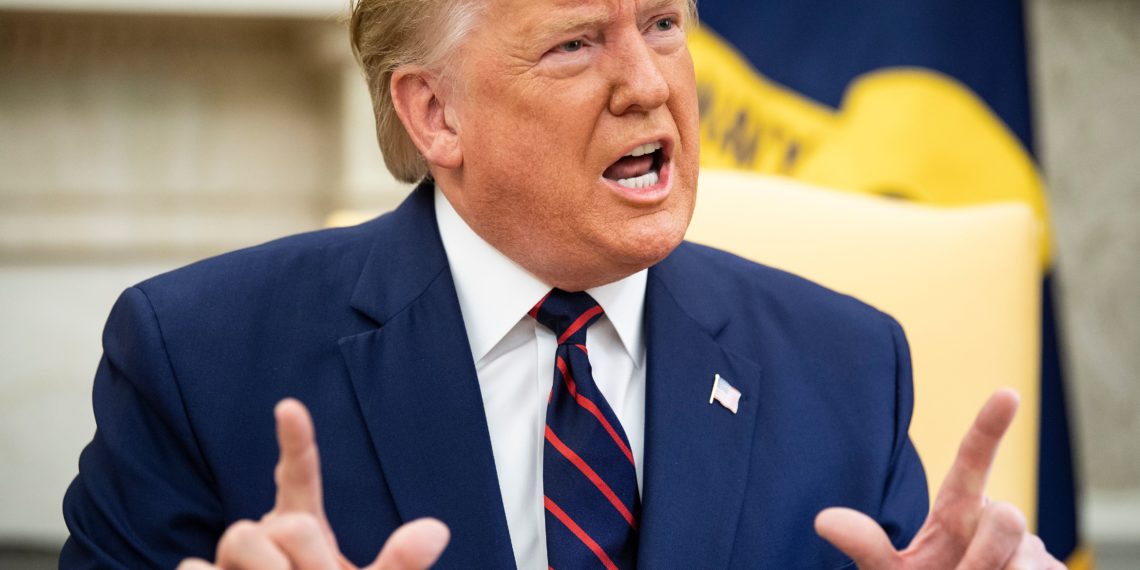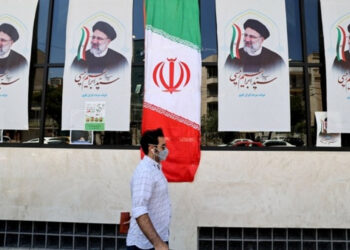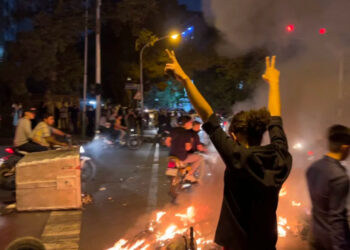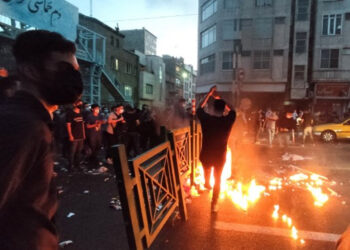U.S. President Donald Trump and his allies are taking a victory lap after major anti-government protests swept across Iran in recent weeks.
The administration has touted the protests as evidence that its “maximum pressure” campaign against the Iranian regime is working after Trump unilaterally withdrew the U.S. from the landmark 2015 nuclear agreement and reimposed crippling sanctions on the country.
Despite having repeatedly denied the claim, U.S. Secretary of State Mike Pompeo appeared to admit in a 2018 interview that the sanctions were imposed in part to make life difficult on the Iranian people and foment unrest, with the ultimate goal of overthrowing the government.
Standing alongside Pompeo in Portugal this week, Israeli Prime Minister Benjamin Netanyahu claimed the Iranian regime is “tottering” after the recent deadly protests.
“I say let’s make it totter even further,” Netanyahu said, addressing Pompeo.
But to Ryan Costello, the policy director for the National Iranian American Council, the celebrating and optimism coming from Iran’s enemies are premature.
While there’s no doubt the sanctions are devastating ordinary Iranians, it remains far from certain that the government will collapse any time soon, or that Iranian leaders will cave and come back to the negotiating table with the U.S., another goal of the maximum pressure campaign.
In fact, Costello predicts the increasing pressure will only make the regime more repressive domestically and more defiant aborad, a prospect he says could be “recipe for disaster.”
With tensions on the rise once again, The Globe Post‘s Bryan Bowman sat down with Costello to reflect on how we got here and how the situation is likely to play out going forward.
The following interview has been lightly edited for length and clarity.
Bowman: Staring in mid-November, major demonstrations broke out across Iran. And because of an internet blackout, it took weeks to get a sense of the true scope of the protests and the government’s subsequent repression of them. At this point, what do we know about the catalyst for these protests and the scale of the crackdown on them?
Costello: Well, in terms of the catalyst, it was [President Hassan] Rouhani’s administration’s decision to end subsidies for gas purchases. That was the initial spark.
But what transpired was kind of a mass venting about the desolate situation in Iran amid the government’s mismanagement of the economy, symbolized by the subsidy decision, and then maximum pressure sanctions, which have been very harmful to the average Iranian.
The scale of the protests was extremely large. They were similar in terms of the number of cities and so forth to protests that transpired back in 2017 and 2018. But the crackdown appears to have been much, much more violent.
I think the numbers back in 2017 and 2018, in terms of deaths, were in the dozens. Now it seems at least to be in the hundreds. The U.S. came out and said potentially over a thousand, though some are questioning that.
But it appears that the Iranian government was on kind of a hair trigger and really put down the protests brutally and arrested thousands.
Bowman: At a recent appearance alongside Mike Pompeo, Netanyahu claimed that the regime is “tottering” and that the protests were evidence that the “maximum pressure” campaign being waged by Israel and the United States is working. Is that true? Is there any reason to believe that the regime is vulnerable?
Costello: Well, I think you see with any society when there are protests of this scale, there’s kind of a long term threat. But I think the Iranian government retains a very brutal tool to put down protests and threats to its rule.
And the government appears to have the capability to turn this into a serious situation where they’d be willing to tear the country apart in order to stay alive and keep the regime intact.
And that’s what you hear from the Iranian people. They’re somewhat concerned about the possibility that Iran would end up looking more like a lot of the neighboring countries torn apart by internal fissures and at war. So up until recently, that had tempered a lot of the protests against the government.
I think it’s hard to predict. This is a government that lasted through eight years of brutal war with Saddam Hussein. It’s lasted through a lot of isolation. It’s hard to imagine things toppling soon, as [Netanyahu] indicated.
But some people have cast this is as kind of like some of the crackdowns under the Shah. And it took a long time to build to a revolution. So if you only rely on repression and are not meeting people’s needs, the revolution can snowball years down the road.
Bowman: Shy of a popular overthrow of the government, another goal of the sanctions and the overall maximum pressure campaign is to pressure Iranian leaders to come back to the table and negotiate an agreement after Trump withdrew from the JCPOA, presumably under terms more favorable to the U.S. and Israel. Iran has thus far been defiant, but is there any reason at all to believe that could change going forward?
Costello: I think Iranian leaders believe that caving to the pressure is a greater threat than maximum pressure.
They believe that they can weather the sanctions storm and either convince Trump to negotiate on their terms, which means alleviating a bit of the sanctions to kick start negotiations or to wait for a future administration to come in and negotiate there.
Now, they are under incredible pressure. The sanctions have been tremendously biting. The Europeans haven’t really stepped up to the table to offset some of the sanctions pain that’s been inflicted by the U.S.
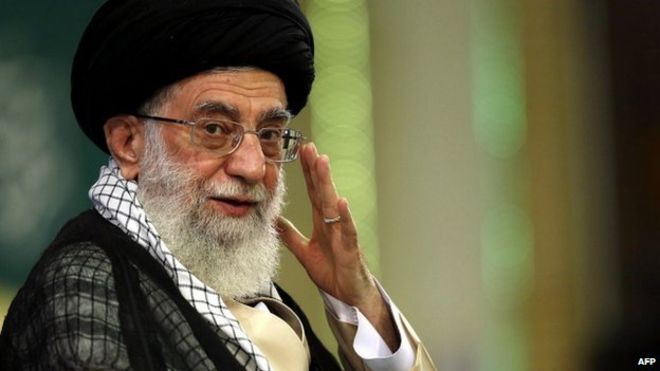
There are some fissures within Iran’s political elite on this. I think the Rouhani administration is much more eager to try to jumpstart negotiations than [Ayatollah Ali] Khamenei. I think Khamenei’s bottom line is that Iran is not going to negotiate under maximum pressure. And he’s able to point to the fact that he warned that this is something that might happen and is blaming moderates for wanting to rely on the prospect of sanctions relief in order to improve the economy.
But the bottom line is Rouhani is not going to negotiate unless there is some sanctions relief up front. And the Trump administration does not appear willing to do what is necessary to jumpstart the negotiations, which is relieve pressure at the outset.
Bowman: What effect have these sanctions had on moderate elements in Iran – the elements that put their necks on the line and advocated for the JCPOA in the first place. Is this discontent strengthening their position domestically, or has the overall sanctions regime and pressure campaign weakened their standing?
Costello: It’s really decimated their standing. We went from a situation back in 2015 where the nuclear deal was being celebrated in the street by Iranians to Rouhani polling at around 20 percent, maybe less. So his support has really fallen off a cliff.
That’s largely because he planned both their domestic reforms and the overall economic situation on getting sanctions lifted. That’s what Rouhani campaigned on back in 2013 and again in 2017, on getting more sanctions lifted. And there’s no real outlet for achieving that right now. So they have really lost a lot of hearts and minds of the Iranian people and are flailing now.
The opposite is happening with hardliners. For years they said that the U.S. can’t be trusted to lift the sanctions.
Rouhani’s challenger from 2017, Abraham Risi, is now head of the judiciary, which is tremendously powerful. And he is overseeing a kind of corruption crusade that is targeting an extremely large number of people and Iran’s political elite. Rouhani’s brother has been caught up and the investigations. And there’s a lot of animosity, not just about the sanctions, but against the government’s corruption.
So there’s an anti-corruption campaign that has been seen a way to get back at and remove the moderates who have tried to change the system incrementally and get hardliners back in power who will be much harsher on protesters and take a much more hawkish position toward the region and the United States.
Bowman: If the sanctions are not bringing about their stated political objective, they’re nonetheless wreaking havoc on the country’s economy and causing a lot of pain for a lot of ordinary people. Can you talk a bit about the consequences of these sanctions for the Iranian people, who the US claims to support?
Costello: They’re causing pain. And when you sanction an economy of 80 million people, it’s hard to ensure that that falls entirely on the Iranian government. In fact, the people have been hurt far more than the Iranian government’s position right now.
And it takes place in the security environment. One thing that Rouhani campaigned on back in 2013 was that, “if we ease the sanctions, we can ease the internal security environment inside Iran.”
But since the [U.S. withdrawal from the JCPOA], we’ve seen the reverse of that, where the sanctions have snapped back and Iran feels it’s under threat and that the U.S. has tried to instigate an overthrow of its government. Certainly, there’s been a lot of rhetoric in that regard to feed Iranian paranoia, which is always there.
So the scale of violence in the repression of the recent protests was really not something that we haven’t seen in recent years. And it eliminates a space for people who want to move the country in a more moderate direction, who want to ease the harsh security environment within Iran, and then open up the country to have a more moderate approach toward regional affairs and so forth.
And then you have the average Iranian working several jobs to try to make ends meet. Their currency is collapsing. A lot of individuals have a hard time purchasing medicine, particularly for rare diseases that are manufactured in the West because banks won’t engage in any human humanitarian transactions.
So the scale of the sanctions is really widespread and felt in a lot of different ways. And it is a really hard thing for the Iranian people to deal with.
Bowman: Taking a step back, how do you think the overall situation might play out from here going forward?
Costello: A lot of things are going to be coming to a head over the next several months with Iran eroding its compliance with the nuclear deal, the Trump administration moving into an election year, trying to up the ante and trying to get some sort of a win when it comes to Iran.
Right now, they’re absurdly doing a bit of a victory lap after this crackdown on the protests and so forth, which I think is pretty crazy.
The pressure is inflicting pain, but it’s not producing a better result. You’ve got a tougher situation for the Iranian people on the ground across the board, you’ve got an eroding nuclear agreement, and then you’ve got a more confrontational Iran across the region. That’s a recipe for a disaster.
So we have to hope that everything holds together here and nothing much worse befalls the Iranian people and the region as a whole in the months ahead.


